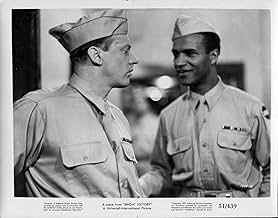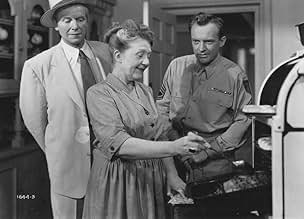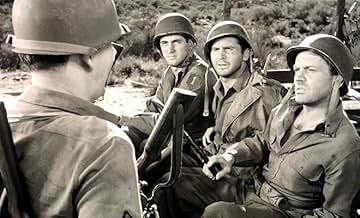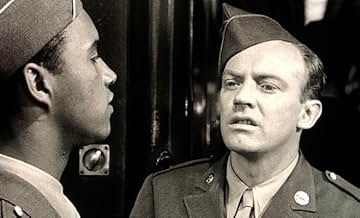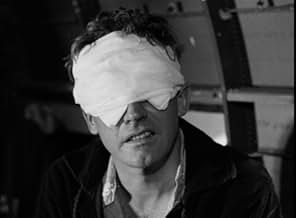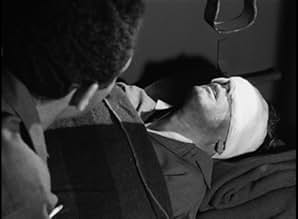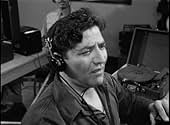VALUTAZIONE IMDb
7,3/10
1103
LA TUA VALUTAZIONE
Aggiungi una trama nella tua linguaAfter he gets blinded by a German sniper's bullet in 1943, Sergeant Larry Nevins begins the long and painful road to recovery.After he gets blinded by a German sniper's bullet in 1943, Sergeant Larry Nevins begins the long and painful road to recovery.After he gets blinded by a German sniper's bullet in 1943, Sergeant Larry Nevins begins the long and painful road to recovery.
- Candidato a 2 Oscar
- 5 vittorie e 6 candidature totali
Julie Adams
- Chris Paterson
- (as Julia Adams)
Recensioni in evidenza
In "Dark Victory" the lead goes blind and faces encroaching death. In "Bright Victory" the lead's already blind and faces encroaching life.
The latter seems far more challenging.
Arthur Kennedy's Oscar-nominated performance as Larry buoys this film from start to finish. His excellent naturalistic style is perfect for the returning disabled vet.
Peggy Dow (as Judy) and Julie Adams (as Chris) are both fine as the women in Larry's life. The script is so sensitively written that both female characters are totally believable in their motivations.
James Edwards delivers his usual solid work as Joe, Larry's best friend.
Mark Robson's direction is efficient and level headed, and the photography, editing and music are all extremely tasteful.
This is one of Authur Kennedy's finest hours, amongst a distinguished body of work during a most versatile career.
The latter seems far more challenging.
Arthur Kennedy's Oscar-nominated performance as Larry buoys this film from start to finish. His excellent naturalistic style is perfect for the returning disabled vet.
Peggy Dow (as Judy) and Julie Adams (as Chris) are both fine as the women in Larry's life. The script is so sensitively written that both female characters are totally believable in their motivations.
James Edwards delivers his usual solid work as Joe, Larry's best friend.
Mark Robson's direction is efficient and level headed, and the photography, editing and music are all extremely tasteful.
This is one of Authur Kennedy's finest hours, amongst a distinguished body of work during a most versatile career.
Poignant account of blinded war veteran adjusting to civilian life. Though the premise has built-in emotional appeal, that fine actor Arthur Kennedy prevents the tale from becoming too sappy or even sentimental. Understandably, there were a number of these "adjustment" movies made after WWII, The Best Years Of Our Lives (1946), and The Men (1950), to name two. More than the others, I think, BV follows one man's (Kennedy) difficulties in re- integrating with family, love life, and community. Naturally, films of this type sought to be uplifting and optimistic in dealing with a devastating post-war problem. BV is no exception. Then too, the racial subtext is well-handled, bringing to the surface those inner qualities that are often overridden by outer appearance. In that sense, Larry's (Kennedy) perception is ironically sharpened by blindness once he figures out the lesson.
The movie's well-made, using actual locations such as city sidewalks, VA hospitals, and train stations, all of which provide a realistic feel. Then too, what guy wouldn't like being helped along by the likes of Judy (Dow) who resembles June Allyson's sexy older sister. Too bad, her accomplished career was so short. Just as regrettable is the amazing James Edwards, one of the first Blacks to get dignified roles. Seems his pioneering career was over-shadowed by the equally charismatic Sydney Poitier.
All in all, the movie surpasses its time because of the common humanity that appeals beneath one man's courageous struggle.
The movie's well-made, using actual locations such as city sidewalks, VA hospitals, and train stations, all of which provide a realistic feel. Then too, what guy wouldn't like being helped along by the likes of Judy (Dow) who resembles June Allyson's sexy older sister. Too bad, her accomplished career was so short. Just as regrettable is the amazing James Edwards, one of the first Blacks to get dignified roles. Seems his pioneering career was over-shadowed by the equally charismatic Sydney Poitier.
All in all, the movie surpasses its time because of the common humanity that appeals beneath one man's courageous struggle.
I stumbled upon this excellent and compelling film during AMC's "Veterans' Day Movie Marathon." Dealing with a soldier's (Arthur Kennedy) rehabilitation after losing his sight during WWII in surprisingly frank ways for its time (released in 1951), this seems to me to be the first time I saw raw racism and its consequences in a film. A superb love story on the surface, it's the underlying themes of classism, racism and realistically dealing with the handicapped which set it a notch above the terrific 1946 film, "The Best Years of our Lives." Face it, Harold Russell, while a hero, was no actor. The electricity between Kennedy and his new "friend" (played by Peggy Dow ~ whatever became of this talented actress? Her career lasted only 4 years) is remarkable. Happy ending doesn't detract.
What is really interesting about this movie, is the "race" issues it addresses and for the time in which it was made, that is rather remarkable.
The Nevins character is a good old boy from the South and openly expresses his racism. The first time is when he's on the plane headed back to the states and a black soldier sits next to to him. They're both from Florida start talking. Nevins asks him if he knows the country club and the guys says he served tables at it. Nevins now realizes the guy is black and immediately calls over a nurse to sit by him.
The next time is in the rehabilitation hospital. Nevins accidentally walks into a black soldier, also blind. All Nevins recognizes is the man's southern accent and offers to buy him a drink. They become "friends" and hang out together. Then one day, the other blind soldiers mention there are some new patients coming into their ward and Nevins pops off, "Yeah, and I heard 3 of them are (uses the "N" word)". The black guys just stops in his tracks now realizing how his new friend really thinks and feels.
The other blind white soldiers already knew the guy was black and remarked "Maybe he thought you were colored too".
Later on Nevins goes home and is with his parents, who are equally racist. Nevins starts to "see" the errors of his ways/thinking. There is a bit of justification from the father that that was how they were brought up, etc., but for 1951 it is amazing they were even addressing such things let alone using the "N" word.
The Nevins character is a good old boy from the South and openly expresses his racism. The first time is when he's on the plane headed back to the states and a black soldier sits next to to him. They're both from Florida start talking. Nevins asks him if he knows the country club and the guys says he served tables at it. Nevins now realizes the guy is black and immediately calls over a nurse to sit by him.
The next time is in the rehabilitation hospital. Nevins accidentally walks into a black soldier, also blind. All Nevins recognizes is the man's southern accent and offers to buy him a drink. They become "friends" and hang out together. Then one day, the other blind soldiers mention there are some new patients coming into their ward and Nevins pops off, "Yeah, and I heard 3 of them are (uses the "N" word)". The black guys just stops in his tracks now realizing how his new friend really thinks and feels.
The other blind white soldiers already knew the guy was black and remarked "Maybe he thought you were colored too".
Later on Nevins goes home and is with his parents, who are equally racist. Nevins starts to "see" the errors of his ways/thinking. There is a bit of justification from the father that that was how they were brought up, etc., but for 1951 it is amazing they were even addressing such things let alone using the "N" word.
"Bright Victory" came as a total surprise. The film is not seen as much as it should, because of its positive message. Mark Robson directed with an eye to detail. "Bright Victory" was adapted by Robert Bruckner and has a pleasant music score by Frank Skinner.
In spite of taking place during WWII, the movie seems timeless right now because of the Iraqi conflict. We are shown an Army hospital where the young soldiers are seen rehabilitating and learning new skills for their permanent disabilities. The wounded men we see in the Army facility at Valley Forge, Pa., are being treated because of their blindness as a result of wounds received in combat.
For a 1951 film, "Bright Victory", was light years ahead since the young G.I.s we see in the hospital have to come to terms with the fact they will not be able to see again in their lives. It's a credit to its director and screen writer to present this new reality the soldiers are going through with compassion and dignity.
A great performance from Arthur Kennedy, one of the best actors of that era, makes this movie appealing. Peggy Dow, as the compassionate young woman who volunteers in entertaining the wounded soldiers, is a welcome presence in the film. Mr. Kennedy and Ms. Dow made the film even better because their no nonsense approach to the portrayal of these two souls that find one another in the worst possible circumstances.
The movie also presents in smaller roles actors that went to have careers of their own. Will Geer, James Edwards, Jim Backus, Richard Egan, Murray Hamilton, Rock Hudson, and Jerry Paris play as part of the ensemble cast gathered for "Bright Victory".
This film is worth seeing because it shows us how some people overcome a terrible fate in a way we never thought possible.
In spite of taking place during WWII, the movie seems timeless right now because of the Iraqi conflict. We are shown an Army hospital where the young soldiers are seen rehabilitating and learning new skills for their permanent disabilities. The wounded men we see in the Army facility at Valley Forge, Pa., are being treated because of their blindness as a result of wounds received in combat.
For a 1951 film, "Bright Victory", was light years ahead since the young G.I.s we see in the hospital have to come to terms with the fact they will not be able to see again in their lives. It's a credit to its director and screen writer to present this new reality the soldiers are going through with compassion and dignity.
A great performance from Arthur Kennedy, one of the best actors of that era, makes this movie appealing. Peggy Dow, as the compassionate young woman who volunteers in entertaining the wounded soldiers, is a welcome presence in the film. Mr. Kennedy and Ms. Dow made the film even better because their no nonsense approach to the portrayal of these two souls that find one another in the worst possible circumstances.
The movie also presents in smaller roles actors that went to have careers of their own. Will Geer, James Edwards, Jim Backus, Richard Egan, Murray Hamilton, Rock Hudson, and Jerry Paris play as part of the ensemble cast gathered for "Bright Victory".
This film is worth seeing because it shows us how some people overcome a terrible fate in a way we never thought possible.
Lo sapevi?
- QuizTen blind WWII veterans at the hospital appeared as extras and were advisers for this film.
- BlooperThe locomotive pulling the train when Joe arrives home in Florida was not produced by American Locomotive Company until 1950, seven years after the actual event. Diesel locomotives were not used on local trains until after the war years.
- Citazioni
Larry Nevins: I told ya i wanted security, remember... well I was looking for it in all the wrong places. Nobody can ever give it to you Judy. That way, it costs too much, you gotta make it for yourself.
I più visti
Accedi per valutare e creare un elenco di titoli salvati per ottenere consigli personalizzati
- How long is Bright Victory?Powered by Alexa
Dettagli
- Data di uscita
- Paese di origine
- Lingua
- Celebre anche come
- Bright Victory
- Luoghi delle riprese
- Azienda produttrice
- Vedi altri crediti dell’azienda su IMDbPro
- Tempo di esecuzione
- 1h 37min(97 min)
- Colore
- Proporzioni
- 1.37 : 1
Contribuisci a questa pagina
Suggerisci una modifica o aggiungi i contenuti mancanti

